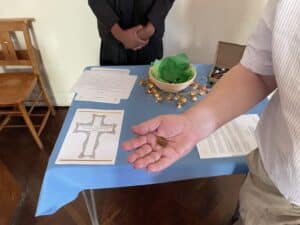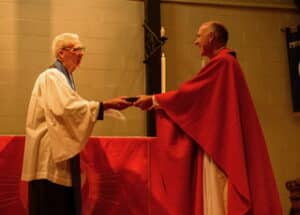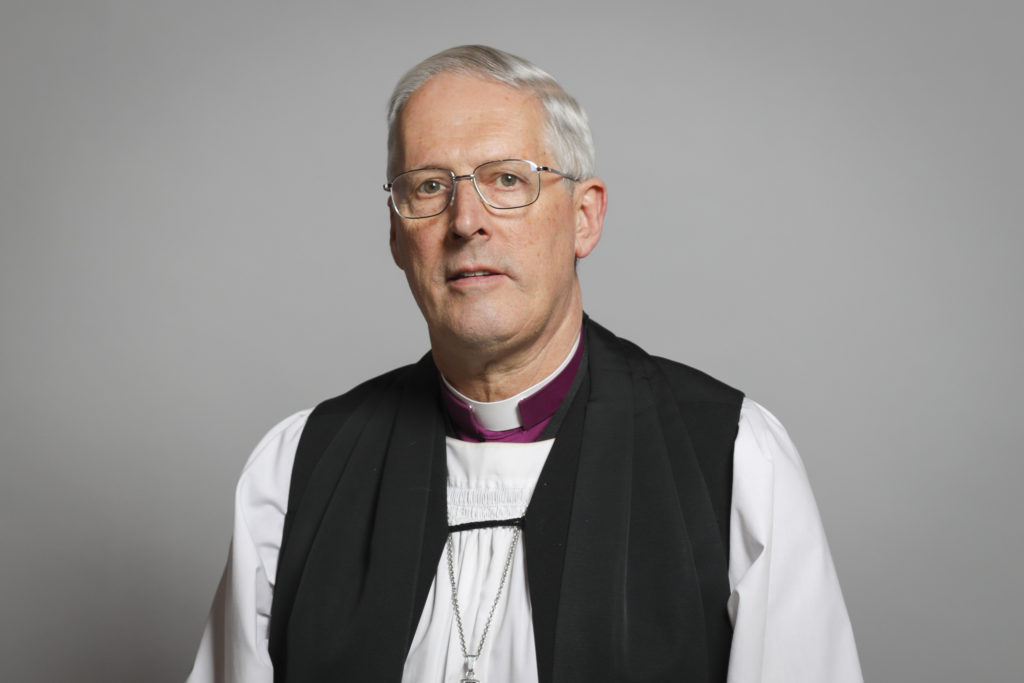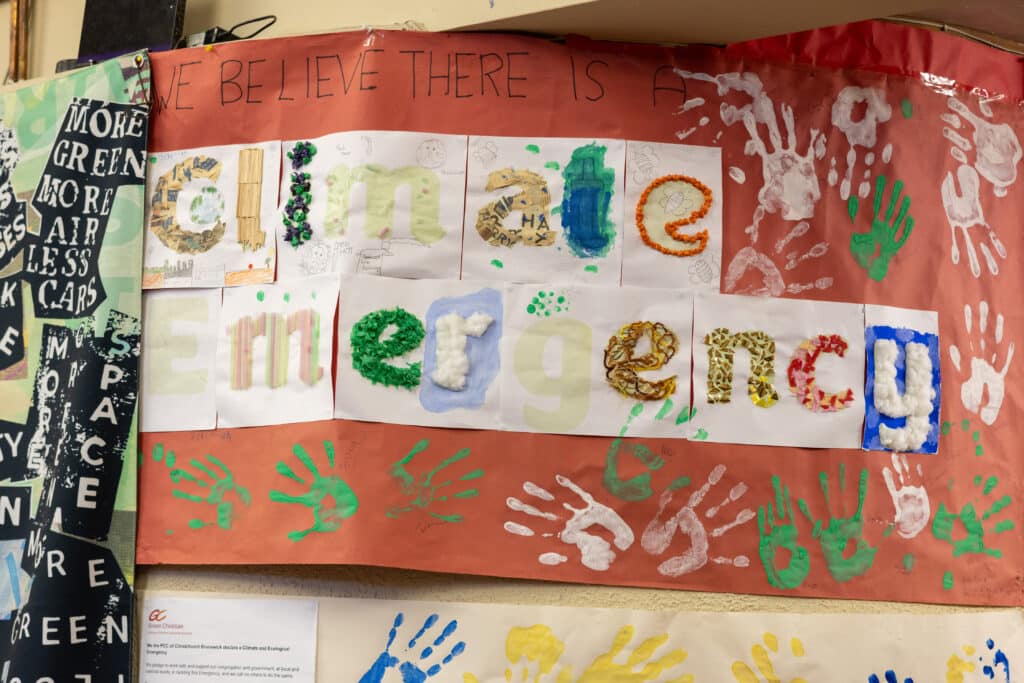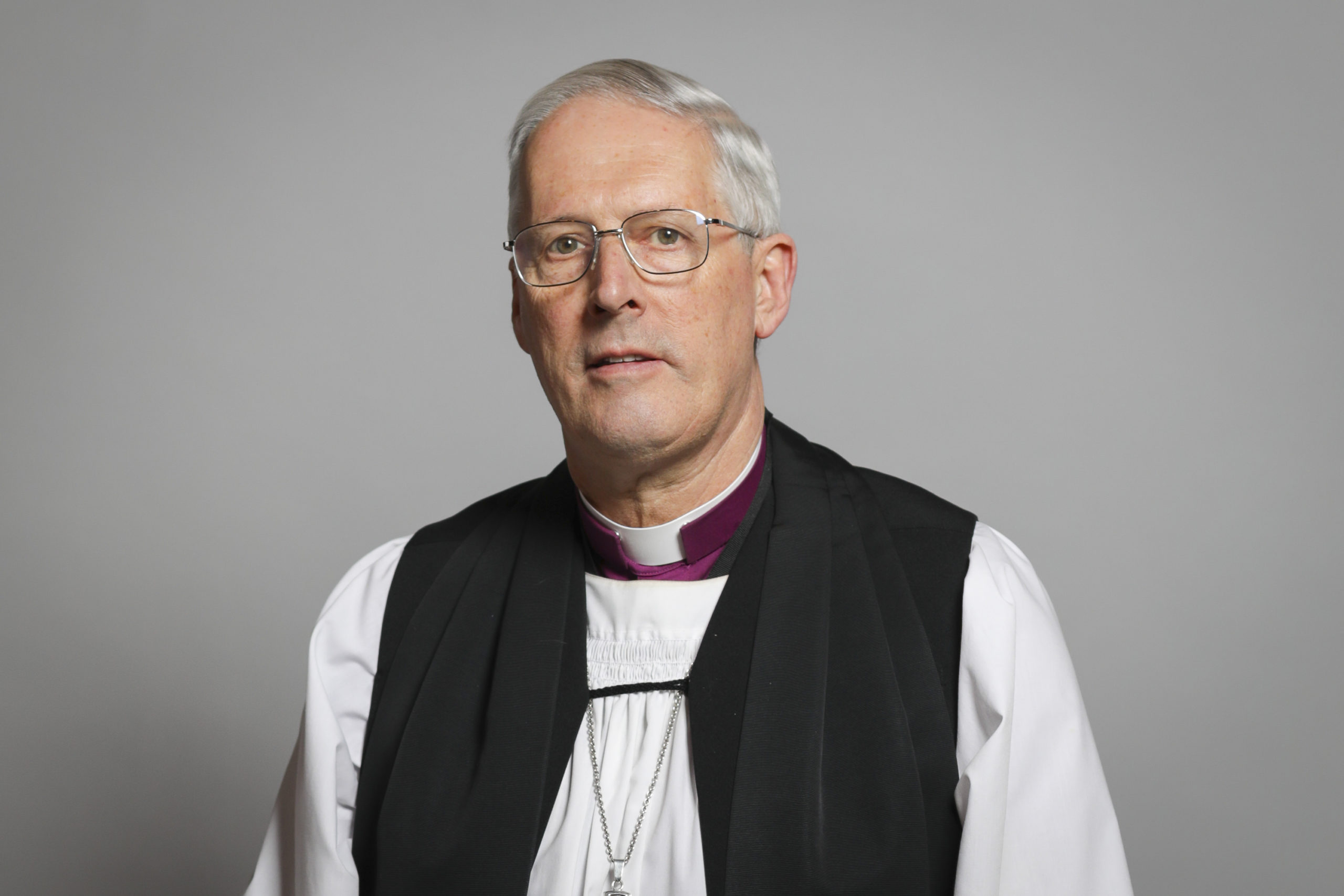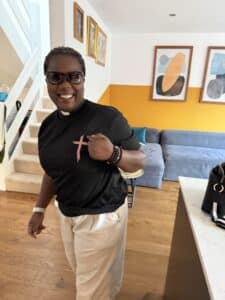
Winnie Obese-Bempong, Assistant Curate for the Parish of Herne Hill
This question, posed in Caesarea Philippi, has always felt less like a theological pop quiz and more like an invitation. Jesus was not asking for a textbook answer; he was asking for a testimony. He was pulling faith from the realm of theory into the messy, beautiful reality of a relationship. The answer would define not only their understanding of him but the very trajectory of their lives.
This question has been my constant companion on my own journey in ministry, a journey shaped by being a Black woman, a mother, a sister, a friend, a daughter of the “Ɔyoko” clan of the Akan people of Ghana, and a deacon in the Church of England. To answer, “Who do you say I am?” has required me to sift through layers of inherited imagery, cultural expectation, and my own lived experience to find a Christ who is not only Lord of all but is intimately for me.
For so long, the Jesus presented in much Western Christianity felt distant. He was framed in European art, explained through European philosophy, and often spoke with a received pronunciation that did not quite resonate with the rhythm of my soul. It created a quiet dissonance, a feeling that to follow him fully, I might have to leave some essential part of myself at the door. Why? This is because the African, throughout history, has been mischaracterised in European conceptions of civilisation via defective anthropological theories, negative imagery, and the compounded effects of a loss of confidence in our own identities, cultural and religious authenticity.
Within most African societies, the idea of a supreme being, a creator God, angels and prophets is as deeply embedded, even preceding European contacts. Among the Akan people of Ghana, there is a saying that “Ɔbi nkyere abɔfra Nyame”, which literally translates as “a man teaches not the child who God is” (meaning, God is embedded in us, and the knowledge of God is innate)
Christ, as the son of God, who came to us as man, and walked this earth, is also one we come to know through the Bible, but also, spiritually and personally in our life’s journey. The knowledge and understanding of Christ Jesus (who he is) is a lifetime journey of discourses, works, worship and many more. And in that process, each individual who seeks the knowledge of Jesus would also be seeking to discover where they have come from and why they are here.
In my own journey, I helpfully came across the work of the unsung Ghanaian theologian and poet, Afua Kuma. In her spontaneous prayers and praises, she didn’t just translate a European Christ into Twi, she revealed a Jesus who was already there, walking the paths of our ancestors. She called him “Yesu a ɔwɔ kwae mu tuntum”—”Jesus of the Deep Forest.”
This was a revelation. Her Jesus was not a faint figure in a stained-glass window. He was the “Great Anchor who never breaks” in the storms of life. He was the “Hunter who shoots the leopard with only his bare hands,” the one who confronts the prowling evils of injustice and despair with fierce, bare-handed courage. This was a Christ who understood the language of talking drums, the wisdom of our proverbs, and the sacredness of community. He was both wholly divine and wholly familiar.
This “Jesus of the Deep Forest” has been my compass ever since. He has walked with me through the sometimes bewilderingly quiet corridors of English cathedrals, where my presence alone felt like a statement. He has sat with me in parish meetings where I was the first Black woman in leadership some had ever met, where the unspoken question “Who do you say that she is?” hung in the air. He has been my comfort in the exhausting, joyful chaos of single parenthood, when sermon preparation competed with packed lunches and the profound questions of a teenage child.
There have been moments of deep loneliness, times when the “single story” of what leadership looks like has felt overwhelmingly heavy. Moments where I’ve felt the subtle (and sometimes not-so-subtle) sting of being seen as the “other”, merely tolerated. My voice is heard but filtered through someone else’s comfort, reduced to a diversity checkbox rather than a called and sent leader of the gospel. In those moments, Afua Kuma’s Jesus whispers: “I am of the deep, dark forest too. I am not afraid of the shadows you carry. I am the Hunter who fights for you”.
So, who do I say that He is?
He is the one who makes me whole. “Ato-ko-a-fre”, when we go to war we call you. “Ɔkatakyi”, the great rock I hide behind, the “Ahunuabbirim”. He is “Etwi”, the cat with the royal mane! “Ɔkokuroko” the Powerful One! “Damfoo-Adu”, the clever one that I rely on as the tongue relies on the month. “Sɛkyerɛ Buruku”, the tall mountain, all the nations see your glory. “Gye Nyame”, Only God. He is the God of love, the God of all cultures, who celebrates my Akan heritage not as a footnote, but as a unique lens through which to reflect His glory. He is the source of the resilience of my foremothers, whose footsteps walk with me time and time again, the kindness in my daughter’s eyes. He is my anchor when the tides of doubt and weariness rise. He is the one who calls me, not despite my identity as a Black woman, but through it, for the healing of the church and the world.
Black History Month, for me, is a sacred time to remember this. It’s a time to testify to the multifaceted, beautiful ways Christ reveals himself to all peoples. It’s an invitation to ask ourselves His question anew: “Who do you say that I am?” That answer may never be spoken out loud by all, but it is a living conversation between the eternal God and our souls.
Your answer, your testimony, in all its unique, God-given colour, is desperately needed.
Amen.
Winnie Obese-Bempong is Assistant Curate for the Parish of Herne Hill
—
References & Further Reading:
- Jesus of the Deep Forest: The Prayers and Praises of Afua Kuma (Edited by Fr. Jon Kirby, SVD) – This is the essential collection of her work.
- The Bible and the Third World: Precolonial, Colonial and Postcolonial Encounters by R.S. Sugirtharajah – For a broader scholarly context.
- The Cross and the Lynching Tree by James H. Cone – A seminal work in Black theology that, while from the American context, powerfully explores seeing Christ through the experience of Black suffering and resilience.
- Theology and Identity: The Impact of Culture Upon Christian Thought in the Second Century and Modern Africa (Regnum Studies in Mission) by Kwame Bediako





